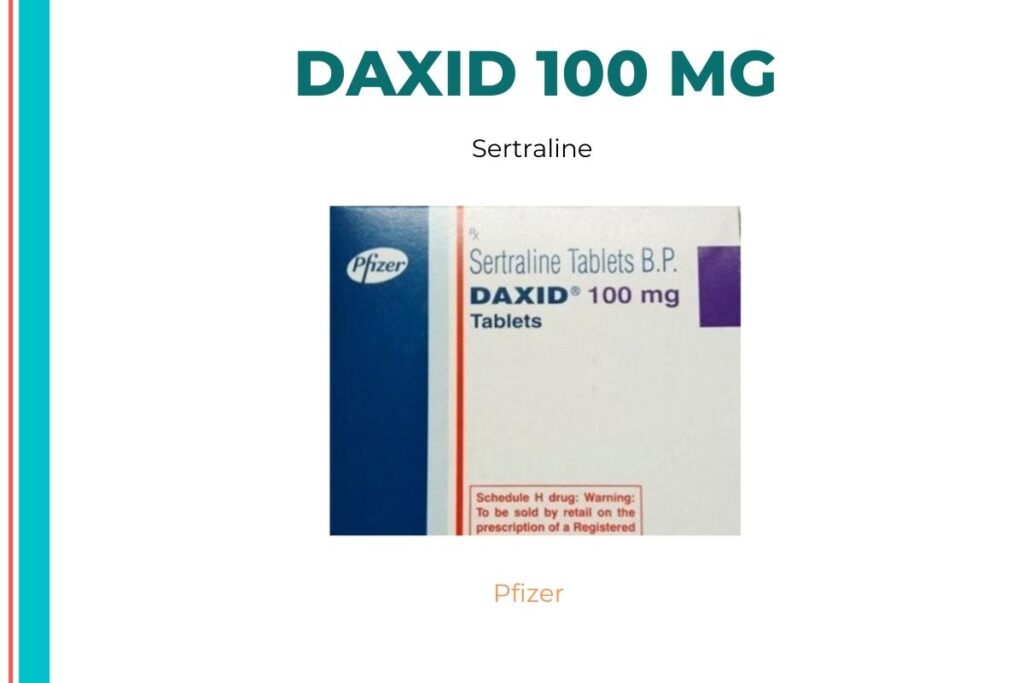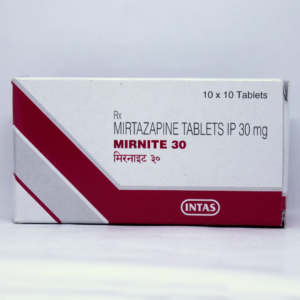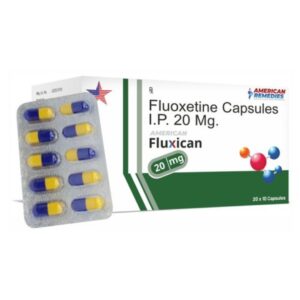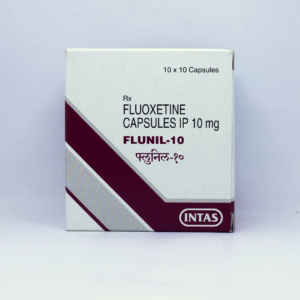Daxid 100 mg
Daxid 100 mg belongs to the class of medications called antidepressants. It is used in the treatment of neurological diseases such as depression, anxiety, post-traumatic stress disorder (PTSD), panic disorder, obsessive-compulsive disorder (OCD) in children and adolescents between 6 to 17 years of age. Depression is a mood disorder characterized by persistent feelings of sadness, loss, or anger. Anxiety is the feeling of fear about what’s about to come. Post-traumatic stress disorder (PTSD) can occur in people who have experienced a terrifying or traumatic event. Panic disorder is characterized by a panic attack in which the patient experiences a sudden feeling of terror even if there is no real danger. Obsessive-compulsive disorder (OCD) is the excessive thoughts that lead to repetitive behavior.
Daxid 100 mg contains sertraline which is a selective serotonin reuptake inhibitor (SSRI). It increases the release of the serotonin hormone in the body, which is responsible for improving mood, cognition, and memory.
Daxid 100 mg is available in oral tablet form. Do not increase or decrease the dose without the doctor’s advice. The dose is determined based on your health condition. Your doctor gradually reduces the dose before stopping the treatment. Do not abruptly stop taking the medication. Abrupt stopping of the treatment may lead to withdrawal symptoms such as flu-like symptoms, headache, dizziness, insomnia, restlessness, and nausea. These symptoms usually appear during the first few days after stopping treatment and go away after a few days. If the symptoms persist or worsen, consult a doctor immediately.
Common side-effects of Daxid 100 mg are drowsiness, dizziness, fatigue, headache, diarrhea, dry mouth, sore throat, loss of appetite, feeling unwell, and irritation. Daxid 100 mg may cause akathisia, a feeling of restlessness, in which the patients unable to sit or standstill. In some cases, Daxid 100 mg may cause suicidal thoughts. The risk is high in children and adolescents. So, patients who are taking Daxid 100 mg are regularly monitored. Normally, these side-effects improve with discontinuation of treatment.
Do not take Daxid 100 mg if you are allergic (hypersensitive) to sertraline or other ingredients present in this medicine. Before taking Daxid 100 mg, inform your doctor if you are antidepressants, antipsychotics, antibiotics, any prescription or nonprescription drugs, or any dietary supplements. Tell your doctor if you are previously diagnosed with seizures, schizophrenia, liver diseases, diabetes, or bleeding disorders. Let your doctor know if you are pregnant or planning to get pregnant or breast-feeding.
Uses of Daxid 100 mg: Depression, anxiety, post-traumatic stress disorder (PTSD), panic disorder, obsessive-compulsive disorder (OCD)

Medicinal Benefits
Daxid 100 mg belongs to the class of antidepressants. It is used in the treatment of neurological diseases such as depression, anxiety, post-traumatic stress disorder (PTSD), panic disorder, obsessive-compulsive disorder (OCD) in children and adolescents between 6 to 17 years of age. Daxid 100 mg is a selective, serotonin reuptake inhibitor (SSRI). It increases the release of the serotonin hormone, which balances the excitatory responses in the body. It helps in improving mood, memory, cognition, and learning. It also helps to regulate digestion, sleep cycle, and food cravings.
Directions for Use
Take Daxid 100 mg as prescribed by your doctor. The dose and duration of the medicine are determined by the doctor. Swallow the medicines as a whole with a glass of water. Do not crush, chew, or break it. You can take the medicine with or without food. Do not abruptly stop the medication even if your symptoms get better. Take the medication at a fixed time every day. Do not decrease or overdose on medicine. If you miss a dose, skip it and take the next dose as usual at the fixed time.
Storage
Store in a cool and dry place away from sunlight
Side Effects of Sertraline
Sertraline may cause side-effects such as dizziness, drowsiness, headache, fatigue, diarrhea, dry mouth, and delayed ejaculation. Other side-effects are sore throat, loss of appetite, increased appetite, restlessness, numbing or tingling sensation, vision problems, tinnitus (ringing in ears), and malaise (feeling unwell). Sertraline may decrease sodium levels.
Precautions and Warning
Do not take Sertraline if you are allergic to sertraline or any of the other ingredients of this medicine. Tell your doctor if you are taking antidepressants, antipsychotic medication, antihypertensives, or antibiotics. Talk to your doctor if you have a history of seizures, bipolar disorder, or schizophrenia. Patients with liver diseases, diabetes, heart disease, and bleeding disorders should use Sertraline with caution. Please do not stop the treatment abruptly as it can cause withdrawal reactions. Sertraline may cause suicidal thoughts and worsen depression or anxiety. Sertraline is used with caution in children and adolescents under 18 years of age as it increases suicidal tendencies in this population.
Drug Interactions
Drug-drug interactions: Sertraline may interact with other antidepressants (moclobemide), Parkinson’s disease (selegiline), antibiotic (linezolid), and anti-psychiatric drug (pimozide).
Drug-food interactions: Avoid alcohol and grapefruit juice as it may increase the risk of side-effects when taken along with Daxid 100 mg.
Drug-disease interactions: Sertraline should be used with caution in patients with seizures, schizophrenia, liver diseases, diabetes, heart diseases, and bleeding disorders.
Safety Advice
ALCOHOL
Sertraline interacts with alcohol and increases the risk of side-effects.
PREGNANCY
Sertraline should be used with caution in pregnant women and women of childbearing potential.
BREAST FEEDING
Sertraline should be used in breastfeeding mothers only when prescribed by a doctor.
DRIVING
Sertraline causes drowsiness. So, it is recommended to avoid driving or operating heavy machinery after taking Sertraline Tablet 15’s.
LIVER
Sertraline should be used with caution in patients with liver diseases. Dose adjustments may be necessary.
KIDNEY
Sertraline should be used with caution in patients with kidney problems.
Habit Forming: No
Diet & Lifestyle Advise
Eat a well-balanced diet.
Avoid processed or packed foods and foods that are high in refined sugars.
Exercise regularly.
Lose excess weight and keep a check on your weight.
Avoid stress.
Improve your mood by being active, socializing with others, and talking about your feelings.
Quit alcohol intake and smoking.
Other Information: item is Not Returnable.
Disease/Condition Glossary
Depression: Depression is a mental health disorder in which patients experience persistent loss of interest or mood and feelings of sadness. It affects quality-of-life. It causes changes in sleep, appetite, social behavior, learning abilities, concentration, and self-esteem.
Anxiety: Anxiety is a feeling of fear, worry, or uneasiness. It is usually a normal emotion. However, if a person experiences repeated episodes of anxiety that gets worsen over time or interfere with daily activities, then the condition is called anxiety disorder.
Post-traumatic stress disorder (PTSD): It is a disorder in which the patient fails to recover from the terrifying experience. The patients often experience nightmares, fear, anxiety, and mood disturbance.
Panic disorder: Panic disorder is a type of anxiety disorder. It is characterized by sudden panic attacks in which patients experience intense fear even if there is no danger.
Obsessive-compulsive disorder (OCD): As the name suggests, patients experience obsessions (intruding excessive thoughts) that cause compulsions (impulsive behaviors). It is characterized by nervousness, repetitive movements or words, and increased alertness.
FAQs
Some patients may experience weight gain after using Sertraline. So, it is advised to keep a check on your weight while using this medicine.
Sertraline may cause gastritis. Consult a doctor if you experience any abnormal side-effects while taking Daxid 100 mg.
Do not stop Sertraline without your doctor’s advice. Sudden discontinuation may lead to withdrawal symptoms such as nausea, insomnia, restlessness, and anxiety.
Sertraline interacts with alcohol and increases the risk of side-effects such as drowsiness. It also worsens the disease condition. So, it is advised to stop taking alcohol.
Sertraline may take one week to several weeks to improve the symptoms as it depends on the severity of the condition.
Sertraline should not be used in children without a doctor’s advice. It is usually used to treat obsessive-compulsive disorder in children above 6 years of age.
It’s not known whether this reduces male fertility. There’s no firm evidence to suggest that taking Sertraline will reduce fertility in women. Talk to your doctor if you’re concerned.







Leave a Reply
You must be logged in to post a comment.